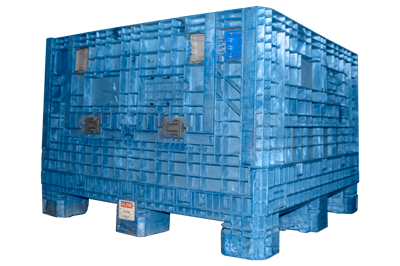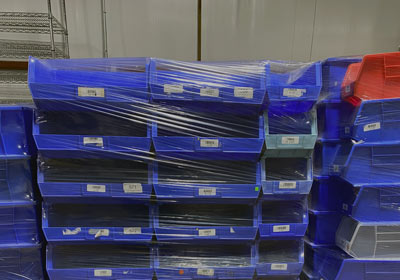Top reasons to choose used bulk containers for sustainable business operations
Wiki Article
Why Mass Containers Are Necessary for Sustainable and Affordable Transport
Mass containers play a necessary role in modern-day logistics. They assist in the efficient movement of huge quantities of goods, thus optimizing transportation processes. This method not only reduces prices however additionally minimizes ecological impact through reduced discharges and waste generation. As sectors look for even more lasting techniques, the fostering of bulk containers is coming to be progressively considerable. What implications does this shift hold for future logistics and supply chain monitoring?
The Advantages of Utilizing Bulk Containers in Logistics
Mass containers reinvent logistics by enhancing performance and sustainability. These containers permit the transportation of huge quantities of items in a solitary trip, noticeably reducing the variety of trips required. This not only simplifies procedures but also lessens labor costs connected with handling, packing, and discharging. Additionally, bulk containers are designed to enhance space utilization within transportation vehicles, making certain that even more products can be shipped all at once.The standardization of bulk containers also simplifies the logistics procedure. With uniform measurements, they can be easily piled and stored, causing enhanced stockroom management. Furthermore, bulk containers usually include long lasting products that secure components from damage during transportation, thus lowering item loss and boosting general integrity. Because of this, businesses can experience enhanced supply chain efficiency, inevitably bring about raised earnings and customer fulfillment. This mix of elements makes bulk containers a vital possession in modern logistics.
Environmental Influence: Lowering Waste and Carbon Footprint
As markets increasingly focus on sustainability, the fostering of bulk containers has actually become an essential technique for lowering waste and reducing carbon impacts. These containers reduce using packaging materials, such as boxes and plastic, therefore significantly reducing total waste generation. By consolidating deliveries, mass containers boost transport effectiveness, enabling for more items to be transported per journey. This decrease in journeys directly associates with lower greenhouse gas emissions, adding to a smaller carbon footprint.In addition, mass containers can typically be reused or reused, even more alleviating environmental effect. The sturdiness of these containers warranties they can endure numerous transport cycles, lowering the requirement for single-use alternatives. used collapsible containers. By streamlining logistics and promoting effective source use, bulk containers not just support sustainable practices however also motivate sectors to straighten with international ecological objectives. Eventually, their execution shows a dedication to environmental stewardship and responsible source monitoring
Cost Savings: How Mass Containers Lower Transport Expenses
While many business look for ways to boost their profits, making use of mass containers presents a considerable possibility for reducing transport expenses. Bulk containers make best use of the quantity of products carried, permitting companies to deliver bigger amounts simultaneously. This efficiency lowers the variety of journeys needed, straight decreasing gas costs and decreasing labor expenses related to loading and discharging.Additionally, mass containers often include streamlined layouts that enhance area application within transport vehicles. This indicates less voids, causing a lot more efficient use of offered capability. In addition, the durability of bulk containers can reduce the threat of product damage throughout transit, decreasing losses and ensuring that more products get here intact.
Enhancing Supply Chain Performance With Bulk Storage Space Solutions
Bulk storage space services play a vital function in boosting supply chain effectiveness by enhancing inventory administration. By settling goods into less, larger containers, companies can significantly minimize handling expenses connected with regular transfers and processing. This structured technique enables far better monitoring and monitoring of inventory, ultimately causing boosted functional efficiency.Streamlined Stock Monitoring
Reliable stock administration is essential for enhancing supply chain operations, specifically when companies embrace bulk storage options. These solutions allow businesses to keep higher supply levels while minimizing the regularity of replenishment. By consolidating materials into bulk containers, business can enhance their inventory procedures, lowering the intricacy connected with tracking several smaller packages. This technique facilitates precise inventory counts and boosts forecasting accuracy, permitting for even more enlightened decision-making. In addition, mass storage space remedies simplify stockroom company, making it easier to locate and gain access to items when needed. As an outcome, organizations can accomplish an extra effective inventory turnover rate, inevitably enhancing total supply chain efficiency and reducing the likelihood of stockouts or overstock situations.
Lowered Handling Expenses
The implementation of bulk storage space services not just simplifies stock management yet additionally considerably lowers taking care of costs across the supply chain. By consolidating materials into bulk containers, business decrease the requirement for regular handling and transfer between different storage space and transportation units. This method minimizes labor prices connected with loading, discharging, and relocating smaller packages. Additionally, bulk storage space reduces the regularity of shipments, causing reduced transport costs and decreased gas usage. Consequently, services can enhance their logistics operations, permitting for a much more efficient allocation of resources. Eventually, minimized taking care of costs add to improved total supply chain performance, promoting a setting that supports both sustainability and financial practicality.
Adaptability of Bulk Containers Throughout Various Industries
Although several industries have distinct needs for transport and storage, bulk containers have actually emerged as a versatile solution that fulfills a vast range of requirements. These containers, ranging from huge containers to specialized storage tanks, can suit varied materials, consisting of liquids, powders, and granules. In the agricultural market, bulk containers facilitate the transportation of fertilizers and grains, while the food and drink market uses them for ingredients and completed products. The chemical sector relies upon mass containers for safely transferring harmful products, making certain compliance with security laws. In addition, building companies gain from mass containers for delivering aggregates and other products. Their flexibility includes numerous settings of transport, consisting of trains, ships, and trucks, improving logistical performance. This convenience not just improves operations across various fields yet also promotes sustainability by decreasing packaging waste and maximizing space en route. Consequently, bulk containers play a necessary duty in more info contemporary supply chain administration.Future Fads wholesale Container Usage and Sustainability
The future of bulk container use is significantly shaped by cutting-edge products advancement that enhances sustainability. In addition, automation in logistics promises to improve procedures, decreasing waste and enhancing effectiveness. Accepting circular economy practices will certainly better change exactly how bulk containers are made, made use of, and recycled, fostering a more sustainable transportation landscape.Innovative Materials Advancement
As industries progressively prioritize sustainability, cutting-edge products growth wholesale containers becomes a substantial variable in improving environmentally friendly transport remedies. Producers and researchers are checking out naturally degradable plastics, recycled compounds, and lightweight metals to minimize ecological impact. These products not just minimize waste but likewise enhance fuel performance by reducing the overall weight of containers. In addition, advancements in wise products, which can adjust to varying problems, enhance the resilience and capability of bulk containers. The combination of these cutting-edge materials aligns with circular economic situation concepts, advertising reuse and recycling. As the demand for lasting methods expands, the development of such products will certainly play a crucial role fit the future of bulk container use in logistics and transport.Automation in Logistics
Considerable innovations in automation are poised to change logistics and the utilization of bulk containers, improving sustainability in transportation. Automated systems, consisting of drones and self-governing cars, are simplifying the motion of mass containers, lowering the reliance on conventional fuel-powered transport. These technologies maximize transmitting and packing processes, improving and decreasing vacant miles gas performance. In addition, automated supply monitoring systems boost monitoring and monitoring of bulk containers, guaranteeing better resource allocation and minimized waste. The integration of the Net of Things (IoT) permits real-time information evaluation, enabling aggressive decision-making that lines up with sustainability goals. As automation continues to advance, it is anticipated to drive even more advancements in mass container usage, eventually sustaining more sustainable logistics methods and minimizing the environmental effect of transportation.Round Economy Practices
Improvements in automation are setting the phase for an extra incorporated strategy to round economy practices in the domain of bulk container use. As industries significantly accept sustainability, bulk containers are being designed for longevity and reusability. This shift not only decreases waste however additionally boosts resource effectiveness. Firms are adopting techniques such as closed-loop systems, where made use of containers are collected, refurbished, and reestablished into the supply chain. Additionally, wise technologies track container life process, helping with far better monitoring and decreasing ecological effect. The collaboration between suppliers, logistics carriers, and end-users is important in developing requirements for sustainable container use. used collapsible containers. Future fads suggest a growing focus on materials that are recyclable and biodegradable, more reinforcing the round economic climate's concepts wholesale transportation
Frequently Asked Inquiries
What Materials Are Bulk Containers Generally Made From?
Bulk containers are typically constructed from durable materials such as high-density polyethylene, aluminum, steel, and cardboard. These products offer toughness, flexibility, and defense, making them suitable for carrying various goods in different industries successfully.Just how Do I Pick the Right Dimension Mass Container?
Choosing the right dimension mass container entails reviewing the quantity of products to be transported, considering handling tools compatibility, and evaluating storage room needs. Appropriate size guarantees efficiency in transport and lessens waste throughout delivery.Are Bulk Containers Reusable or Recyclable?
Bulk containers are frequently reusable, made for numerous trips, boosting sustainability. Lots of can likewise be recycled, relying on the products used. Picking recyclable alternatives additionally sustains ecological objectives and lowers waste in transportation methods.What Security Regulations Put On Bulk Container Transport?
Safety and security policies for mass container transportation consist of compliance with the Division of Transportation guidelines, appropriate labeling of unsafe materials, architectural honesty assessments, and adherence to weight restrictions to ensure safe handling and prevent crashes throughout transportation.Exactly How Can Services Change to Utilizing Mass Containers Efficiently?
Companies can transform to bulk containers by assessing existing logistics, training personnel on handling, spending in suitable tools, optimizing inventory monitoring, and working together with providers to assure compatibility and effectiveness throughout the supply chain.
As markets increasingly prioritize sustainability, the adoption of mass containers has actually emerged as an essential method for decreasing waste and reducing carbon impacts. By settling products into bulk containers, business can enhance their supply processes, minimizing the intricacy linked with tracking multiple smaller plans. As sectors increasingly prioritize sustainability, ingenious products advancement in mass containers arises as a significant element in boosting environmentally friendly transportation options. Automated systems, including drones and autonomous vehicles, are simplifying the movement of mass containers, minimizing the reliance on conventional fuel-powered transport. Furthermore, automated supply management systems enhance monitoring and tracking of bulk containers, ensuring much better source appropriation and minimized waste.
Report this wiki page